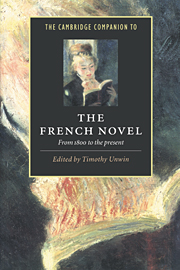Book contents
- Frontmatter
- 1 On the novel and the writing of literary history
- 2 Novels of testimony and the 'invention' of the modern French novel
- 3 Reality and its representation in the nineteenth-century novel
- 4 Women and fiction in the nineteenth century
- 5 Popular fiction in the nineteenth century
- 6 Decadence and the fin-de-siècle novel
- 7 The Proustian revolution
- 8 Formal experiment and innovation
- 9 Existentialism, engagement, ideology
- 10 War and the Holocaust
- 11 From serious to popular fiction
- 12 The colonial and postcolonial Francophone novel
- 13 The French-Canadian novel
- 14 Gender and sexual identity in the modern French novel
- 15 Postmodern Frenchfiction
- General bibliography
- Index
7 - The Proustian revolution
Published online by Cambridge University Press: 28 May 2006
- Frontmatter
- 1 On the novel and the writing of literary history
- 2 Novels of testimony and the 'invention' of the modern French novel
- 3 Reality and its representation in the nineteenth-century novel
- 4 Women and fiction in the nineteenth century
- 5 Popular fiction in the nineteenth century
- 6 Decadence and the fin-de-siècle novel
- 7 The Proustian revolution
- 8 Formal experiment and innovation
- 9 Existentialism, engagement, ideology
- 10 War and the Holocaust
- 11 From serious to popular fiction
- 12 The colonial and postcolonial Francophone novel
- 13 The French-Canadian novel
- 14 Gender and sexual identity in the modern French novel
- 15 Postmodern Frenchfiction
- General bibliography
- Index
Summary
When Marcel Proust cites Racine or Saint Simon, Flaubert and Baudelaire in A la recherche du temps perdu, he embeds the literature and language of the past into the present of a narrative laced with criticism. Creating a new context from which to speak of literature and reading, he rejected the notion of a canon as that which imposes a universalising style on heterogeneous thought. Yet the search for what is most unique for the writer produced a work considered now to be one of the most canonical.
As the narrator of A la recherche du temps perdu looks back on the great works of the nineteenth century, he notes incompletion: Balzac's Comédie humaine, Hugo's La Légende des siècles, Michelet's La Bible de I'humanité, all were completed through prefaces serendipitously written after the fact. Like Wagner and Ruskin, these authors discovered unity in retrospect, creation occurring in discrete fragments whose relation remained unsuspected, unbound by any thesis until a 'retrospective illumination' swept them into a whole. Proust sets a different course for his work, mapping out the project of a book unified from its very inception, although it would be exceeded endlessly by the process of writing. Searching the Judeo-Christian tradition for the secret of creation, he looked to philosophy, music and painting to help transform the reading of literature into writing.
- Type
- Chapter
- Information
- The Cambridge Companion to the French NovelFrom 1800 to the Present, pp. 111 - 125Publisher: Cambridge University PressPrint publication year: 1997

